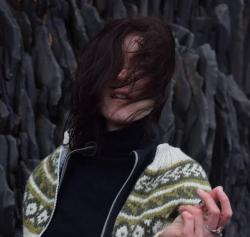
Reykjavík’s literary world celebrated solstice with a duet of events featuring heavyweight UK poets Lavinia Greenlaw, Paul Muldoon and poet laureate Simon Armitage.
As one of Ireland’s foremost poets, Muldoon has published over thirty collections, including works that have won him a Pulitzer Prize and the T.S. Eliot Prize for Poetry. He held the Oxford Professor of Poetry post from 1999-2004, a post that is now held by Armitage. As a poet, novelist, and translator, Armitage is similarly highly acclaimed for his lifetime commitment to literature. Armitage recently received the position of Britain’s Poet Laureate. Greenlaw’s impressive catalogue includes libretti, soundworks, novels, and poetry. Her book ‘Questions of Travel: William Morris in Iceland’ annotates 19th-century textile designer and author William Morris’ travel writing with her own poetic suppositions.

While each author has previously visited Iceland, this is the first time they appear together in the country for literary events. Armitage has previously visited Iceland while writing ‘Moon Country’ together with Glyn Maxwell, and Greenlaw spent time here while researching her poetic meditation on Morris’ travels through Iceland in the 1870s.
Co-organized by the University of Iceland‘s Institute of Research in Literature and Visual Arts and the Reykjavík UNESCO City of Literature, the events focused on an interview session as well as a book launch and readings. The events are an extension of Sjón’s organizational efforts for the 2017 conference “The Tower at the End of the World,” an impressive gathering on island literature held in the Faroe Islands.
Unfurling poetic connections
Friday’s public conversation at Veröld focused on unfurling poetic connections between Iceland and the British Isles. Greenlaw, Muldoon, and Armitage were joined by translators and scholars Kristín Svava Tómasdóttir, Aðalsteinn Ásberg Sigurðsson, and Sveinn Yngvi Egilsson to explore literary intersections in the north.
One recurring theme was the remote and isolated nature of Iceland. “It was at the top left of the map,” said Armitage, describing his own fascination with Iceland in conversation with Sveinn Yngvi Egilsson. “It always felt alluring and mysterious.”
Armitage also suggested that the nature of islands themselves may have held a key appeal, describing how they hold a “contrast both of prison, maroonment, and also paradise.” He suggested that the nature of Great Britain as an island may well have meant writers such as W.H. Auden and William Morris felt an affinity with Iceland.

Sense of removal
Greenlaw suggested that this could have been a key reason why it drew Morris in particular to Iceland in the 1870s, emphasising his desire to escape his increasingly unhappy marriage and for a sense of removal. Though nearly 150 years have passed since Morris’ experiences in Iceland, his accounts may resonate with tourists today. Greenlaw explained that Morris was outraged to discover that there were already British travellers in Iceland “and that there was rubbish and litter at the geysers.”
But it was perhaps the social aspect that really struck Morris the most. His famous quote–“the most grinding poverty is a trifling evil compared with the inequality of classes”—may well have been influenced by his experience of the already relatively classless Icelandic society. Greenlaw asserted how this initially came as a shock to Morris’ “wealthy Victorian confidence.” “People would come up and talk to him,” described Greenlaw. “He could look at the place, but was surprised that the place could look back.”

Interesting tension
For the second event held at the Nordic House, the fine literary press Dimma published bilingual editions of poetry books by each author in a series called ‘Letters to Iceland.’ Greenlaw’s “Kennsl” (meaning identification or recognition) was translated by Magnús Sigurðsson, while Sjón translated Muldoon’s “Seven poems” as “Sjö ljóð.” Sigurbjörg Þrastardóttir handled the translation of Armitage’s “Þaðan sem við horfum” (“From there we look”). Poets and translators read aloud excerpts from the books at the launch.
In addition to these events, Muldoon, Greenlaw, and Armitage attended a guided tour of Kjarvalsstaðir’s exhibition “Sölvi Helgason: Blómsturheimar,” in the same space where Morris’ exhibition “Alræði fegurðar!” is now in residence through October 10th. They also met with first lady Eliza Reid at Bessastaðir, and visited Borgarfjörður for the Settlement Centre and the Borg á Mýrum church where Iceland-UK connections were emphasised.
Of her experiences in Iceland, Greenlaw commented that “there’s always a sense of possibility. You can stand on the sea and look out. You feel both a sense of travel and being held back. It’s an interesting tension.”

The ‘Letters to Iceland’ series is generally available in bookshops. To read more about literature in Iceland, click here.
Buy subscriptions, t-shirts and more from our shop right here!


















